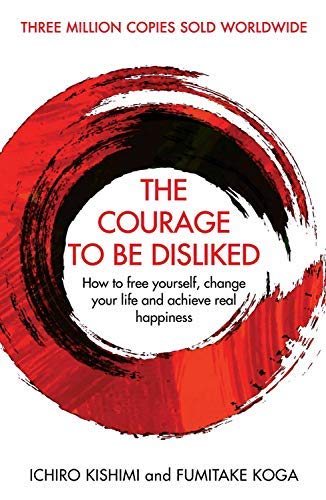A Liberating Discourse on Freedom and Happiness – The Courage to Be Disliked (2013)
THE COURAGE TO BE DISLIKED

The Courage to Be Disliked, written by Ichiro Kishimi and Fumitake Koga, is a stimulating and introspective read, challenging conventional perspectives on happiness, self-improvement, and social belonging. The book, structured as a dialogue between a philosopher and a young man, offers enlightening insights rooted in the principles of Adlerian psychology.
URL: https://amzn.to/3O5S523
Author: ICHIRO KISHIMI
4.5
RATING: 4.5
The Courage to Be Disliked, written by Ichiro Kishimi and Fumitake Koga, is a stimulating and introspective read, challenging conventional perspectives on happiness, self-improvement, and social belonging. The book, structured as a dialogue between a philosopher and a young man, offers enlightening insights rooted in the principles of Adlerian psychology.

At the heart of this book is the concept of “separation of tasks” and the idea that every individual is responsible for their actions and feelings. This tenet, seemingly simple, is a transformative concept, enabling readers to re-evaluate the responsibility they take for their lives and their happiness.
The title itself, ‘The Courage to Be Disliked’, is a powerful message urging individuals to liberate themselves from societal expectations and their fears of rejection. It does not promote antisocial behavior, but a freeing, confident individuality that is not shackled by the opinions of others.
The authors do an excellent job of breaking down complex psychological principles into accessible, digestible content. The Socratic dialogue style is effective in gradually unfolding Adlerian concepts like life-lies, inferiority complex, self-acceptance, and community feeling, to name a few.
The dialogues engage the reader in deep introspection, bringing forth the realization that freedom is not about being free from societal shackles but about freeing oneself from self-imposed limitations. The book encourages readers to step out of the victim mentality and embrace the notion of being the ’cause’ rather than the ‘effect’.
The prose can feel didactic at times, but considering the philosophical and psychological underpinnings, this is perhaps unavoidable. Some might argue that the book oversimplifies the human psyche’s complexities, but it does not claim to be a comprehensive psychological guide but a digestible introduction to Adlerian psychology’s ideas.
One of the book’s crucial messages is that happiness is a feeling that arises not from being loved but from the act of loving or contributing to others. This viewpoint offers a refreshing deviation from the self-centric perspectives prevalent in many self-help books.
‘The Courage to Be Disliked’ invites the reader on a journey of self-discovery and challenges them to confront their fears, re-evaluate their beliefs, and make conscious choices. It encourages readers to exercise the courage to change, contribute, and, most importantly, to be true to themselves, even in the face of adversity or disapproval.
In conclusion, ‘The Courage to Be Disliked’ is a compelling read for anyone interested in exploring the depths of their mind, breaking free from self-imposed constraints, and embarking on a fulfilling journey towards genuine happiness. It delivers a bold, liberating, and potentially life-changing perspective on personal freedom and contentment.



